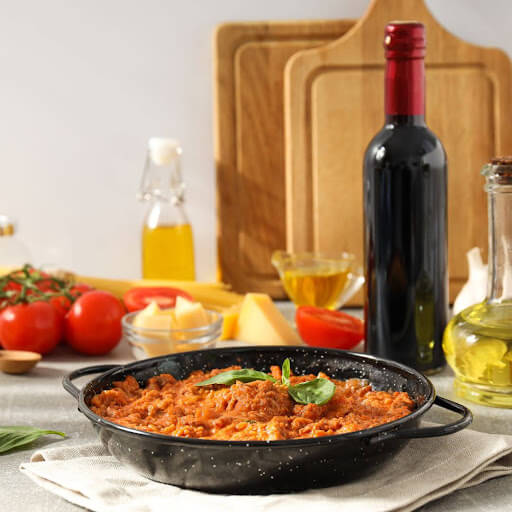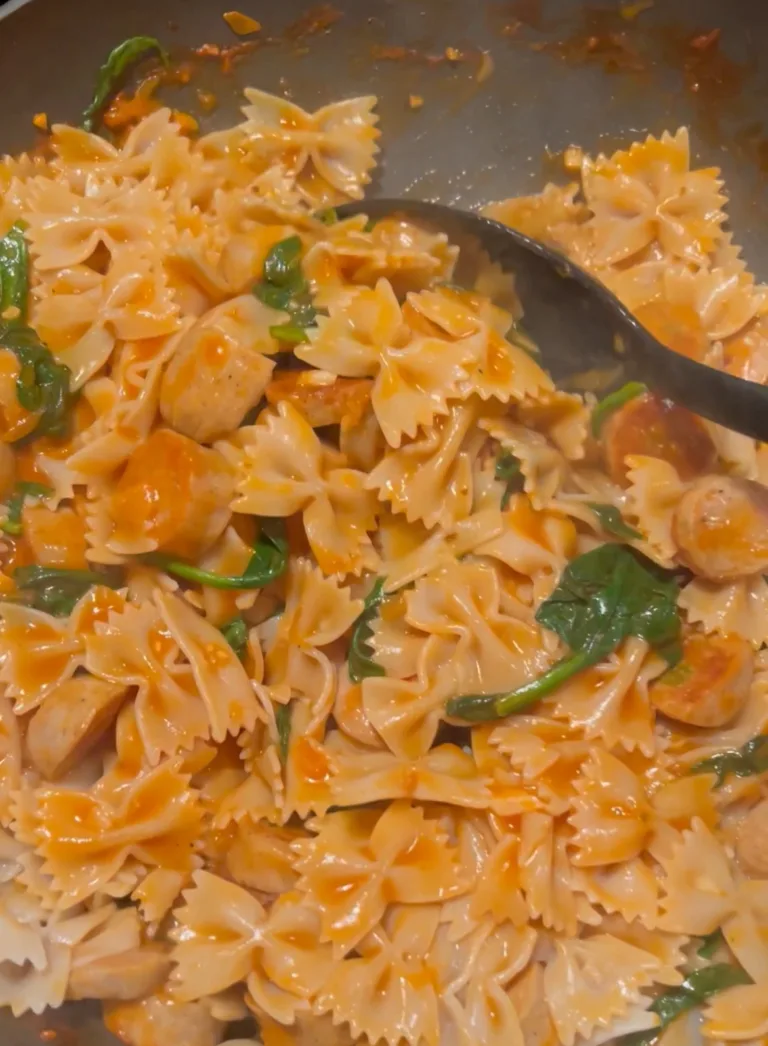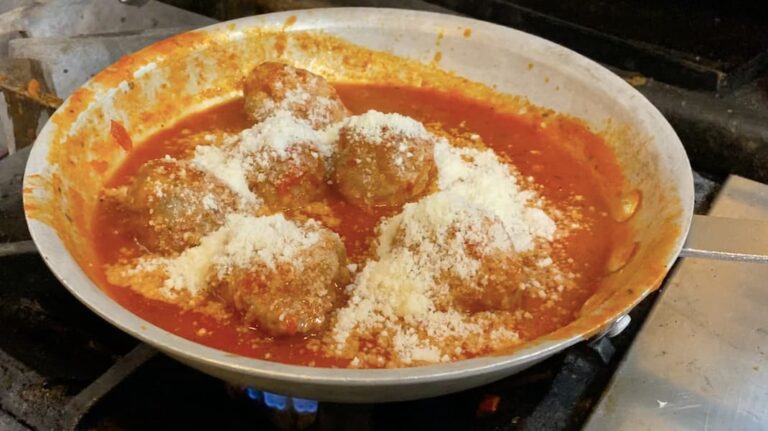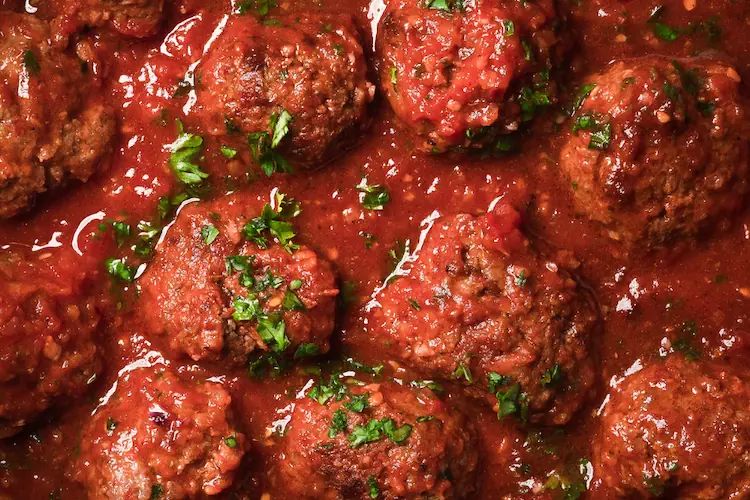Here at Mortadella Head, we take bolognese sauce very seriously.
Ragù alla bolognese is a staple of Italian culinary tradition. Originally born in Bologna, it is used to make some of the most iconic and beloved Italian pasta dishes – which, funnily enough, do not include spaghetti bolognese.
Over the years, we have posted the patented recipe on our blog, along with the one Chuck and Sebby use every day at their restaurant and lots of tips on how to make it at home. However, there is still one topic we haven’t touched on: how to pair it with a good wine!

The right wine pairing always takes every meal to the next level. And if you are preparing a special ragu dinner, or want to know what to order next time you go to your trusted Italian restaurant, this post is for you.
By now I’ve published several posts on how to pair wines with Italian food, and this time too I’ve done my research and selected the best wines I could find.
Let’s get started!
What to Know: Unveiling the Ideal Wine Characteristics for Bolognese Sauce
As per usual, let’s start by breaking down the sauce’s elements and understanding what to look for in a wine.
The hearty combination of ground beef, tomato sauce, and fresh herbs like basil and oregano creates a symphony of flavors. To match this, a wine needs high levels of acidity to cut through the richness, firm tannins to stand up to the meat, and enough body to hold its own. Italian reds often fit this profile perfectly. Notes of red and black fruits, hints of spice, and a medium to full body are desirable.
Wines made from Sangiovese grapes, like Chianti Classico, are classic choices, but exploring beyond can lead to unexpected and delightful pairings. Whether it’s a full-bodied red wine or a dry white wine with good acidity, the goal is to find a balance that complements the sauce’s depth without overshadowing it.
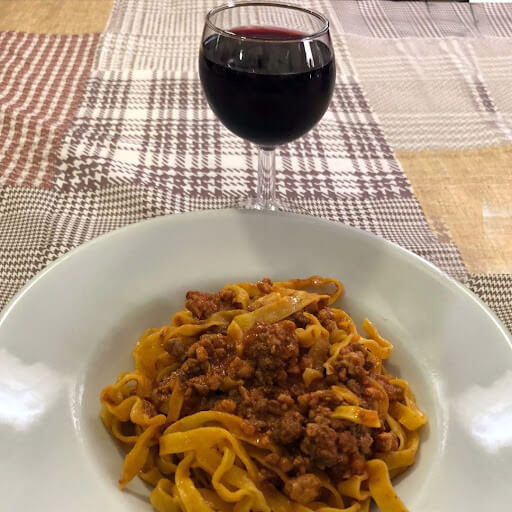
6 Wines to Pair with Bolognese Sauce
Chianti Classico: The Epitome of Italian Tradition
Chianti Classico, produced in the heart of Tuscany, is a quintessential Italian wine made predominantly from Sangiovese grapes. Its high acidity and medium body make it an excellent match for tomato-based sauces. The wine exhibits flavors of red cherries, dried herbs, and earthy notes, which resonate with the ingredients in Bolognese sauce. The firm tannins provide structure, while the wine’s vibrancy enhances the dish’s flavors.
Recommended choice: Chianti Classico DOCG 2022 – Selezione Castello Vicchiomaggio
This Chianti Classico greets the nose with aromas of violet, wild berries, and subtle spices. On the palate, it is elegant and juicy, featuring fine and delicate tannins. The elevated acidity contrasts richness of the red sauce, bringing out the savory notes of the meat and the sweetness of the tomatoes.
Best enjoyed between 2024 and 2028 at a serving temperature of 16-18 °C, it transforms a simple pasta dish into a memorable experience.
Barbera d’Asti: A Vibrant Companion
Hailing from Piedmont, Barbera d’Asti is celebrated for its high acidity and soft tannins. The wine’s flavors of ripe red fruits and subtle spice make it an excellent choice for Bolognese sauce.
Its medium body ensures it doesn’t overpower the dish, while the good acidity cuts through the sauce’s creamy texture. Barbera’s approachable nature makes it suitable for both seasoned wine enthusiasts and those exploring Italian wines for the first time.
Recommended choice: Barbera d’Asti Superiore DOCG 2020 – Villa Lanata
With a rich aroma profile of mature red fruits and spices, this wine is full-bodied and persistent, featuring soft tannins. The vibrant acidity contrasts with the sauce’s richness, offering a harmonious pairing. Ideal for consumption between 2024 and 2027 at 16-18 °C, it complements any Bolognese dish beautifully.
Lambrusco: The Sparkling Surprise
Often associated with sweet and simple wines, Lambrusco from Emilia-Romagna offers more complexity than meets the eye. This slightly effervescent red wine showcases flavors of strawberries, cherries, and sometimes even black pepper.
The good acidity and slight sweetness make it an intriguing pairing for Bolognese sauce, cutting through the richness and refreshing the palate. It’s a perfect match for those seeking to try something different with their pasta Bolognese.
Recommended choice: Emilia Lambrusco Rosso Frizzante IGT “Otello Ceci NerodiLambrusco”
This Lambrusco presents notes of red fruits like strawberries and blackberries. Soft and slightly sweet, it finishes with a fresh and pleasant aftertaste. The interplay between its sweetness and acidity offers a modern and surprising pairing with Bolognese sauce. Best consumed until 2024 at a serving temperature of 12-14 °C, it’s a delightful addition to the dinner table.
Brunello di Montalcino: Depth and Elegance
Brunello di Montalcino, from southern Tuscany, is made exclusively from Sangiovese grosso grapes. This full-bodied red wine is known for its depth, complexity, and aging potential. Flavors of ripe dark fruits, spices like cloves, and earthy undertones make it a luxurious pairing for Bolognese sauce.
The wine’s high acidity and firm tannins balance the sauce’s richness, elevating the classic Italian dish to new heights.
Recommended choice: Brunello di Montalcino DOCG 2019 – Rio del Cipresso
Featuring notes of violet, mature fruit, and spices, this wine has a silky and balanced structure. Its elegance and depth enhance the gastronomic experience when paired with Bolognese sauce. Best enjoyed between 2024 and 2030 at a serving temperature of 18-20 °C, it’s ideal for formal dinners and special occasions.
This wine is also recommended for pairing with Chicken Cacciatore.
Cabernet Sauvignon: The Bold Choice
For those who prefer a full-bodied red wine with firm tannins and high levels of acidity, Cabernet Sauvignon is an excellent option. With flavors of dark fruits, black pepper, and sometimes notes of oak and vanilla, this wine stands up well to the hearty Bolognese sauce. Its robust structure complements the meat’s depth and the sauce’s richness, making it a great match for this classic dish.
Recommended choice: Guado al Tasso 2018 – Antinori
A Cabernet Sauvignon that shouts confidence, the Guado al Tasso 2018 from Antinori delivers layered complexity paired with a robust tannic backbone. It surprises with dark fruit intensity interwoven with subtle spice and vanilla nuances. Its high acidity acts almost like a sonic boom against the rich tapestry of the Bolognese, cutting through the meatiness and tomato depth with unexpected grace.
While the structure anchors the palate, leaving behind a clean, refreshing finish, the wine’s unpredictable character enhances the dish rather than overpowering it. This pairing becomes an exploration, each sip echoing bold flavors that resonate with the hearty sauce, creating a dynamic interplay that elevates the entire dining experience.
Sangiovese di Romagna: A Regional Delight
From the Emilia-Romagna region, Sangiovese di Romagna offers high acidity and pronounced tannins. The wine’s fruity notes of cherry and hints of spice align seamlessly with the flavors of Bolognese sauce. Its robust character and medium body make it a traditional pairing, reflecting the local wine culture and enhancing the dining experience.
Recommended choice: Romagna DOC Sangiovese Superiore “Taibo” 2022 – Tenuta Santa Lucia
Taibo stands out as an elegant example of Sangiovese di Romagna, melding robust structure with nuanced floral and fruity expressions. Its ruby red consistency is inviting, leading to a nose filled with notes of violet mammola and fresh red fruits like blackberry and cherry. The wine’s full and balanced palate introduces a dance of ripe fruit and refined tannins, creating a compelling conversation with the hearty Bolognese sauce.
View this post on Instagram
A post shared by Tenuta Santa Lucia Biodinamica (@santaluciabiodinamica)
Exploring Beyond: Other Notable Mentions
While Italian reds are often the go-to choices, exploring wines like Nero d’Avola from Sicily or Montepulciano d’Abruzzo can offer new dimensions to the pairing. These wines bring unique flavor profiles and can handle the sauce’s intensity. For those inclined towards white wines, a dry white wine with good acidity, like a Pinot Grigio or Sauvignon Blanc, can provide a refreshing contrast.
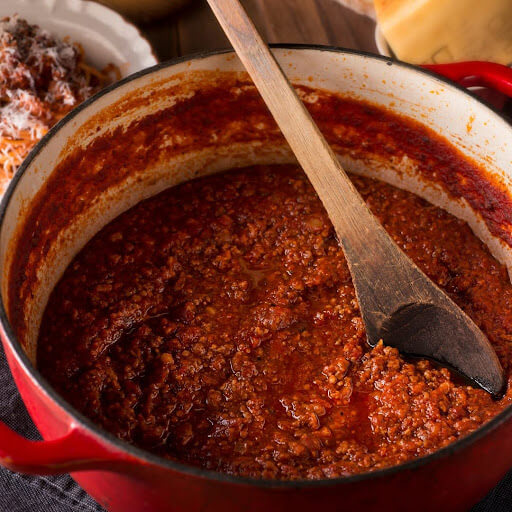
Conclusion
The world of wine offers a wide variety of options to complement the hearty Bolognese sauce. From the traditional Chianti Classico and Brunello di Montalcino to the surprising Lambrusco, each wine brings its own character to the table. Understanding the importance of acidity, tannins, and body helps in selecting the perfect wine. Whether it’s your first time pairing wine with pasta Bolognese or you’re seeking to enhance your culinary expertise, choosing the right wine transforms a simple meal into an unforgettable dining experience.
file name & alt text: best bolognese wine pairings

